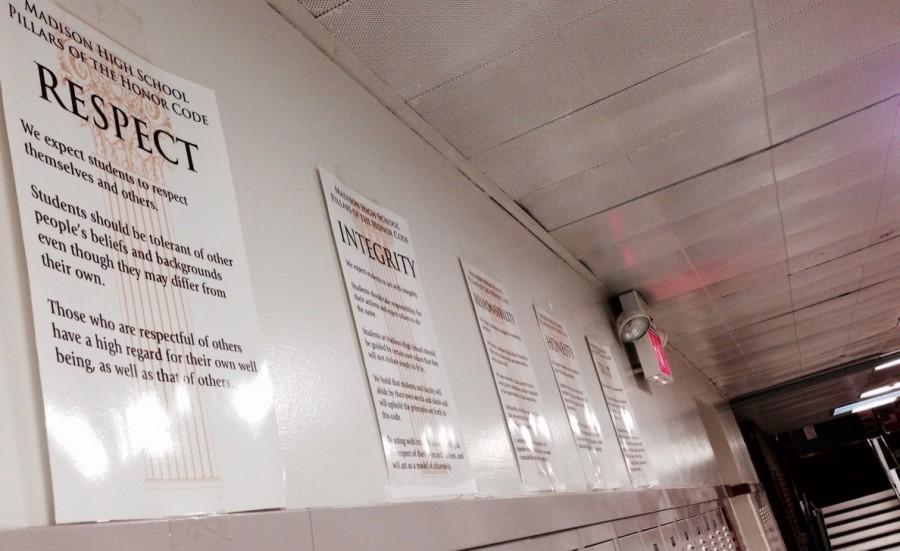It took 12 hours to realize it was a bad idea. With the creation of a single Twitter account, the majority of Madison High School’s student body was buzzing; within hours, the account of Dodger Anonymous had garnered 110 followers but had tweeted only 18 times. Its tweets delved into students’ personal lives, but unlike Dodger Compliments or Dodger Problems, which post student praise and funny appraisals of life at Madison High, Dodger Anonymous’ tweets were cruel and vindictive. However, all of these accounts are affiliated with Madison High School through the use of the Dodger mascot, and this reflects badly on Madison High School.
Most high schoolers use social media, and most Madison High School students had access to these tweets, creating a huge number of bystanders to an egregious act of bullying. However, these students were not complicit in these actions just by witnessing them; aside from reporting and flagging the account, which some students did, the students could do nothing to take down the account. While it did not stop the tweeting, some students stood up to Dodger Anonymous, and tweeted back admonishments. By showing that students see Dodger Anonymous as the aggressor, the students removed some of the shame from those being bullied and confirmed their right to privacy despite the use of social media. However, student response to the account also drew more attention to it. While it is important to speak out against bullying and to pay attention to actions like this, it’s also important not give too much attention to online aggressors, knowing that the account was created for attention.
Dodger Anonymous only scratches the surface of the negative behavior. Some teenagers thrive on gossip and negativity, partially because of their own insecurities and partially because they are influenced by the media, which promotes gossip and negativity. The proof was evident when Dodger Anonymous took it into his or her own hands to publicize hurtful gossip and insults that had evidently circulated within the school.
Although it may seem that Madison, a small, quiet town with several anti-bullying programs in place throughout its school system, has eradicated bullying, accounts like Dodger Anonymous prove otherwise. Due to the rising popularity of anonymous accounts, such as Tumblrs and ask.fms, bullying can reach a larger audience than ever before. Making it worse, this virtual bullying lets its perpetrator hide behind anonymous screen names, lending whoever is behind the account the false courage to post outrageously nasty comments he or she would likely not say in person. In addition, cyber bullying leaves a permanent record of cruel digs; with screenshots and favorited tweets, Dodger Anonymous’ remarks could live for years.
These attacks are not without permanent damage. The effects of online harassment create a lasting scar on its innocent victims. Chloe Schorr, a member of the Dodger staff, experienced bullying during her sophomore year. She explained that a group of students created multiple Facebook pages and Twitter accounts targeting her. She was faced with a volatile barrage of insults and rumors voicing negative sentiments against her. Fortunately, the incident died down after two weeks, just as Dodger Anonymous died out within 24 hours, but the words stung and the experience stuck with her.
The outrage against Dodger Anonymous was immense. The backlash was swift and strong because the infamy of the account rose so quickly and people were so stunned that an individual would go out of his or her way to insult so many people in such a public manner. In the face of such a negative and hurtful account, positivity remains in that our community showed no tolerance for that type of behavior. Instead, people fought back. Numerous upperclassmen protected their targeted friends with snarky responses to the taunting tweets. The administration was notified and the account ceased posting tweets. The responses showed a true sense of unity throughout the student body. Though most students were fully unsupportive of the account, others argued that discussing the events would only fuel the situation. To ignore it, some claimed, would end the drama. Schorr, remembering her own experience, disagrees, “It’s much easier to say ignore it…but when it’s you being publicly humiliated by faceless words, it makes you feel completely worthless.” Most students agree. Called “disgusting,” “nasty,” and “scary”, Dodger Anonymous elicited reactions from students in all grades, attesting to the fact that the account was humiliating and needed to stop. Its existence, however, reminds the student body and administration of a bigger problem at hand: bullying and cyber-bullying and its ubiquitous presence in modern society. There is no clear solution at the moment, though most MJS graduates will remember preventive programs implemented in the junior school that discouraged hurtful behavior and misuse of social media. Dodger Anonymous is simply a testament that the message did not reach some. We as a community have the power to effect change. As disgraceful as this incident was, it has shown that every student in Madison High School has the ability to have his or her own voice heard. We will not allow one voice of hate overwhelm the strength of the voices of good. This behavior has got to stop. It’s toxic.
